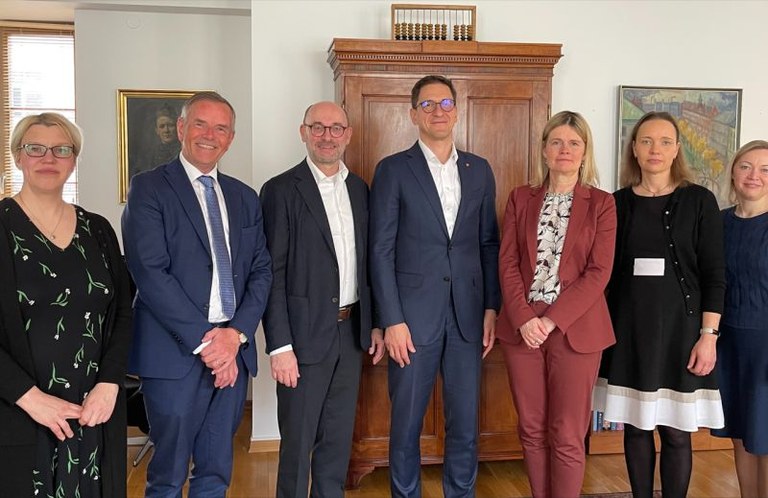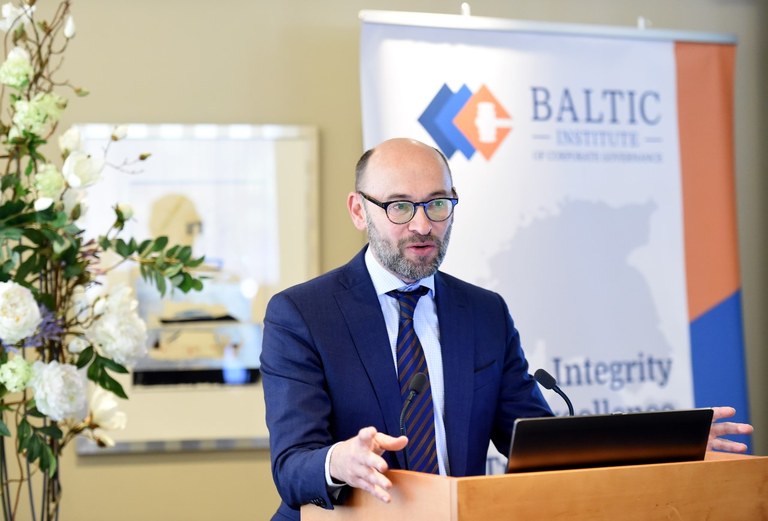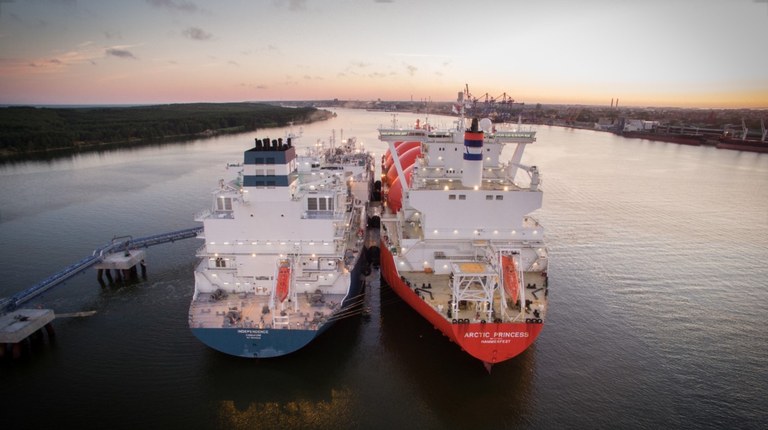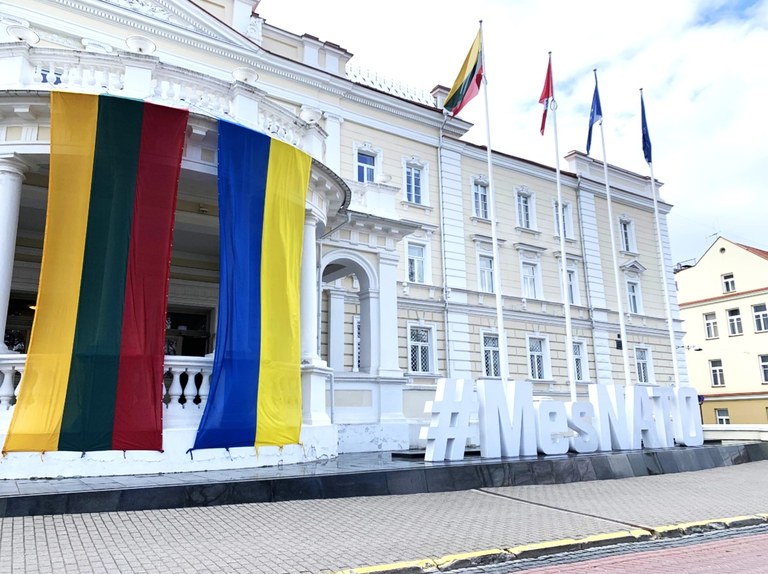New energy in cooperation between the Baltic Sea countries
A new wind is blowing for the cooperation on greener energy and security in the Baltic Sea region, believes Denmark’s ambassador to Lithuania.
In the harbour of Lithuania's only port city Klaipėda lies the ship "Independence". It functions like a depot for imported liquefied natural gas. This solution means Lithuania is now independent of Russian gas and the enormous ship was ordered by the Lithuanian government on the same day Russia invaded Eastern Ukraine in 2014.
Lithuania’s energy supply is changing tack once more – this time in a greener direction. As the first of the Baltic countries, Lithuania has decided to build offshore wind turbines in the Baltic Sea. This is an important signal for new opportunities in a greener Baltic Sea region, thinks Denmark’s ambassador to Lithuania, Hans Brask.
“Lithuania was one of the first countries to decide to become independent from Russian energy, and has secured that independence in practical terms with the ship “Independence”. Lithuania is now taking another big step, this time towards independence from fossil fuels by establishing offshore wind turbine parks in the Baltic Sea.
Lithuania as an energy hub
This political decision has fantastic potential for the green transition, believes the Danish ambassador.
“Lithuania is the first Baltic country to invest in offshore wind energy, and the country is also looking at solar power, energy islands and green hydrogen. These are technologies and projects that Denmark and the other Nordic countries prioritise, and this is also one of the areas where Denmark is already cooperating closely with Lithuania and that cooperation can be further intensified in coming years.”

Ambassador Hans Brask, third from the left, during a breakfast meeting with the Lithuanian Minister of Energy Dainius Kreivys (in the middle).
Hans Brask had a lunch meeting with Lithuania’s Minister of Energy this spring, and the Danish ambassador also invited his Nordic-Baltic ambassador colleagues to come along.
“During that meeting, Lithuania’s Minister of Energy presented a clear vision for Lithuania to become a future energy hub in the Baltic region with the export of green electricity from wind turbines and green fuels based on hydrogen,” explains Hans Brask.
Wind, solar and new nuclear energy
Lithuania expects investors to look to the Baltic region to explore the potential offered by green energy from the Baltic Sea. This spring, Lithuania opened its first tender for the construction of an offshore wind farm with a capacity of 700 MW. The next tender is expected in the autumn of this year.
To supplement this, Lithuania’s Minister of Energy wants to develop small and innovative nuclear reactors, and the country is already well underway in developing solar power parks.
“There are many good reasons to cooperate closely in the Baltic Sea region to make Lithuania’s green vision a reality. This is first and foremost about finally becoming independent from Russian energy, but also about reducing the region’s total carbon footprint. It will also help develop the region's common electricity market, which will improve energy security,” says Hans Brask.

Hans Brask during a conference organised by the Baltic Institute of Corporate Governance. Photo: BICG.
He believes Denmark and the Nordic cooperation can play an important role here.
“Latvia, Estonia and Poland all want to go in the same direction, so this could really get a green transition going which Denmark and the Nordics can support since we are slightly further ahead with realising our visions for sustainability,” says Hans Brask.
Before Lithuania joined the EU in 2004, nuclear power was an important energy source for the small Baltic country that was occupied by the Soviet Union between 1940 and 1991.
But in order to gain EU membership, Lithuania had to close the Ignalina nuclear power plant that shared its reactor design with the Chernobyl nuclear power plant. This meant the country would no longer be energy self-sufficient.
“Since then, Lithuania has been dependent on imported electricity, but this could now change with the new wind and green technology investments,” points out Hans Brask.
Seven times more offshore wind energy
The Danish ambassador sees new opportunities for closer cooperation on common challenges inside the framework of the Council of the Baltic Sea States (CBSS) since Russia is no longer part of that cooperation. The country was excluded in 2022 when it attacked Ukraine.
“The war in Ukraine has led to more instability in the Baltic Sea region, but there are some benefits to this situation. As Russia is no longer a CBSS member, we can revitalise the cooperation between the remaining countries and make decisions on things that it used to be impossible to agree on – including the aim to make the Baltic Sea region greener and independent from fossil fuels.”

LNG is created by cooling natural gas to 162°C below zero, and is then transported on special ships like the one to the right. Independence is next to it, working as a gas terminal, where the LNG is heated up into natural gas again which is inserted into the national gas pipeline system. Photo: Höegh LNG.
Denmark has been active in creating a new dynamic in the regional cooperation. The country’s Prime Minister hosted a CBSS summit in 2022 where the member countries agreed to increase energy from offshore wind turbines in the Baltic Sea sevenfold by 2050.
A development like that would also create a basis for maritime transport across the Baltic Sea based on green hydrogen, which would further benefit the climate.
Nato and the sea of peace
Despite the war in Ukraine – and also because of it – the Danish ambassador sees clear signs that the Baltic Sea countries are seriously starting to fulfil the potential within the Baltic Sea cooperation, especially when it comes to energy and the environment.
He also expects that Finland and Sweden’s Nato membership will provide greater security for the region.
“Right now, the stability has taken a hit because of the war in Ukraine, but the dynamics will change with Sweden and Finland as new Nato members. All of the Baltic Sea countries except Russia will then be members of both the EU and Nato. The countries as a group will be stronger, and that will be a deterrence to Russian aggression.”
There will be a lot of focus on security in the region when Nato holds its summit in the Lithuanian capital Vilnius in July this year.
“A stronger Nato presence in this part of Europe will improve security not least for Lithuania and the other Baltic countries,” concludes the Danish ambassador.

Lithuania’s Ministry of Defence in Vilnius with a Nato sign in front and a Ukrainian flag next to the Lithuanian one.
- Independence
-
Lithuania was the first EU country to stop Russian gas imports with immediate effect as a response to the war in Ukraine. The gas terminal Independence, constructed as a ship, allows Lithuania to import liquified natural gas.
- Changing of the guard at the embassy
-
Denmark and the rest of the Nordics have had strong links to all three Baltic states, including Lithuania, since independence in 1991. Hans Brask has worked with Baltic Sea cooperation for years, first as head of the Baltic Development Forum think-tank where he organised a range of summits on the region’s development together with the Nordic Council of Ministers secretariat.
Businesses, governments and NGOs met to discuss how to get the most out of the region’s potential.
Since 2019, Brask has served as Denmark’s ambassador to Lithuania. Before that, he spent four years serving as Denmark’s ambassador to Latvia. In the summer of 2023, Hans Brask will return to the Ministry of Foreign Affairs in Copenhagen.
- The Council of the Baltic Sea States
-
The CBSS was set up on a Danish-German initiative in 1992 in Copenhagen as a regional political forum. It includes the 11 states that border the Baltic Sea, and at the time of its founding, it also included the European Commission.
Since 1998, the CBSS has had a permanent secretariat in Stockholm.
During Denmark’s CBSS Presidency in 2020, the countries decided to revitalise their cooperation on issues like climate change.
Russia and Belarus left the CBSS in 2022, following the invasion of Ukraine.
Source: The Danish Ministry of Foreign Affairs et al
- Lithuania
-
A small, open economy that has gone through major social and economic change after regaining independence in 1991, as a result of comprehensive reforms in nearly all areas of society.
The country has experienced nearly uninterrupted economic growth since independence, only broken by a short but severe slow-down in 2009 during the financial crisis.
Unemployment has been falling steadily in the past ten years and stood at less than 7 per cent in 2022. Inflation is very high right now as a result of the war in Ukraine and the energy crisis.
Source: The Danish embassy in Lithuania
 Follow us on Facebook
Follow us on Facebook
